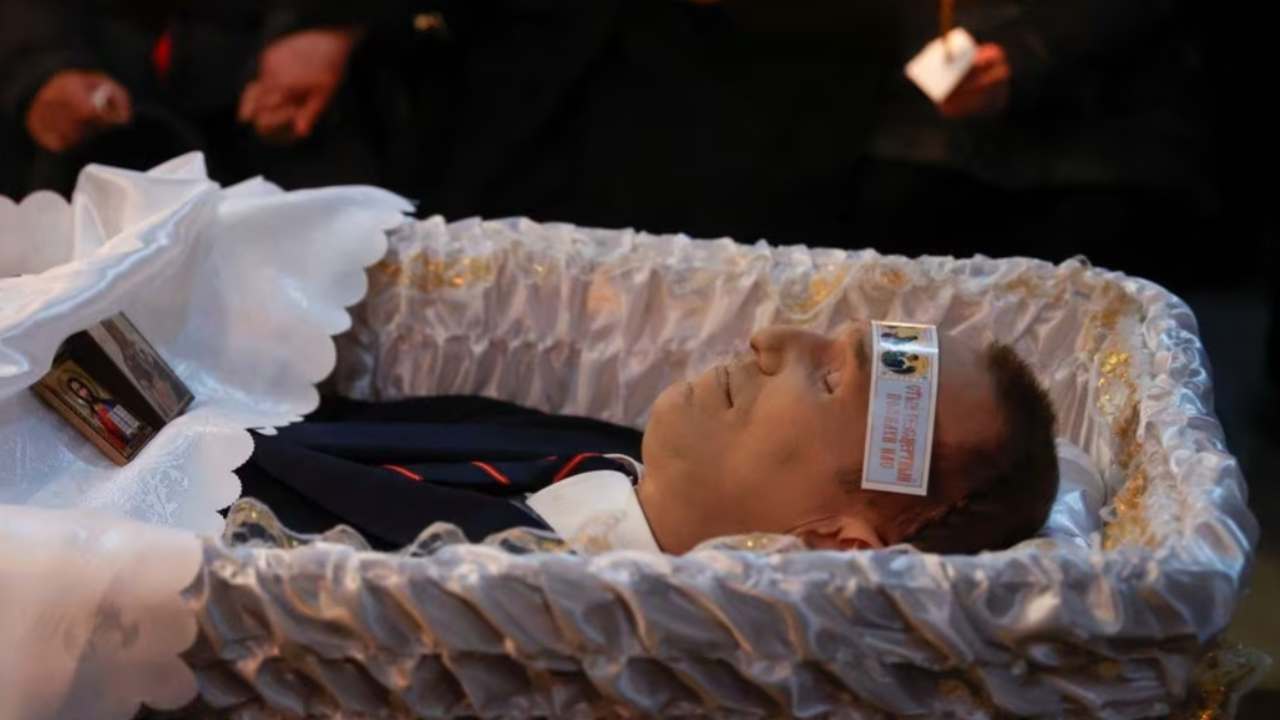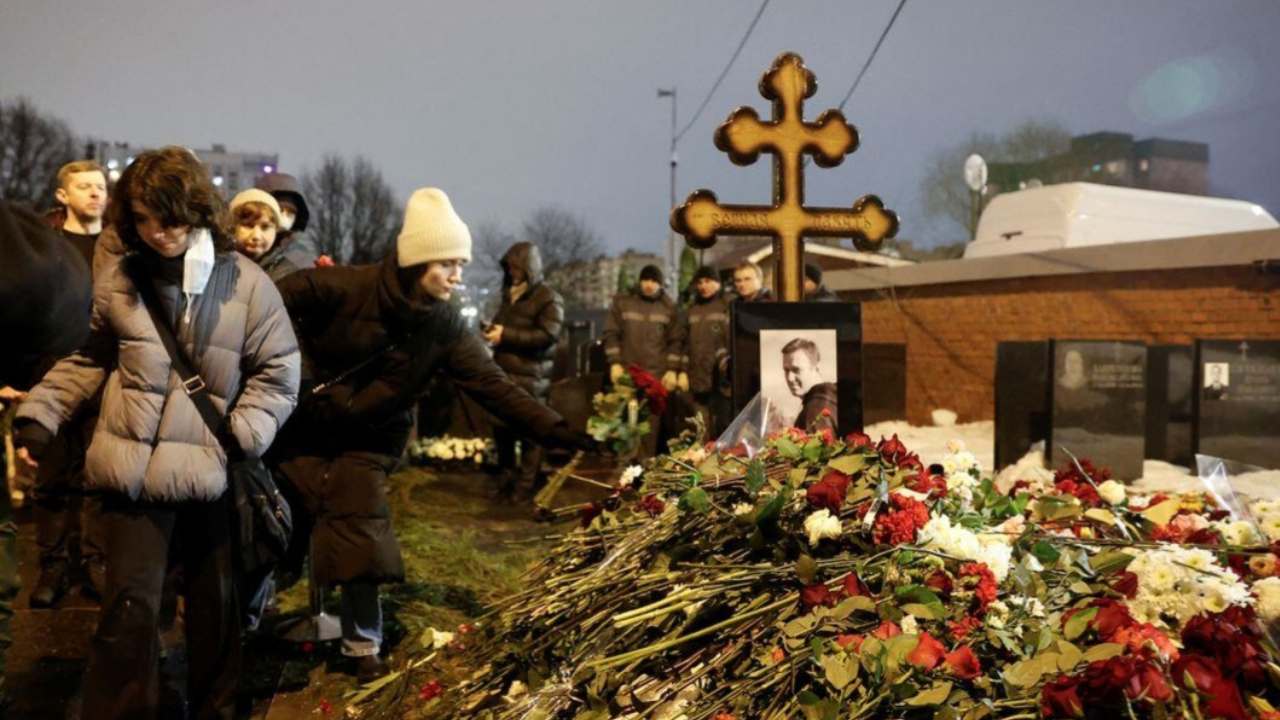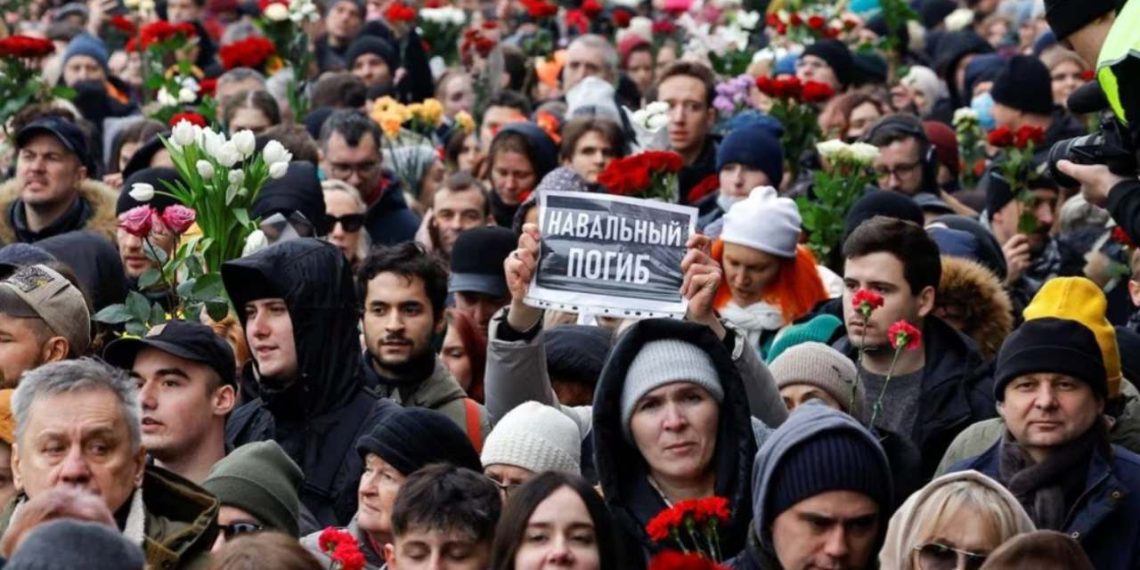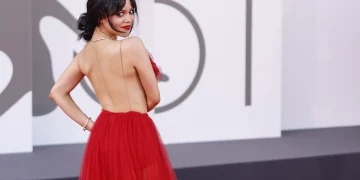Thousands of mourners in Moscow defied the Kremlin’s warning of arrests to bid farewell to opposition leader Alexei Navalny, who died two weeks prior in an Arctic prison.
Despite heavy police presence, crowds chanted “Putin is a murderer” and “No to war” as they marched to the Borisovsky cemetery.
Navalny, 47, was laid to rest on Friday to the strains of Frank Sinatra’s “My Way”. The public display of support transformed Navalny’s funeral procession into a rare act of dissent amid escalating repression in Russia.

Amid loud applause and chants of “Navalny,” the hearse bearing his coffin arrived at the Quench My Sorrows church in the Maryino district, where the late politician once resided before being poisoned with the Novichok nerve agent in 2020. Navalny’s parents, Lyudmila and Anatoly, along with a small group, attended the church ceremony preceding the burial.
A photograph released by Navalny’s team depicted his body in an open casket adorned with flowers, flanked by his grieving parents.
“This is an image that should have never existed,” a tearful Leonid Volkov, Navalny’s longtime ally said during a livestream of the funeral on Navalny’s YouTube channel.
Following the brief religious procession, Navalny’s coffin was transported to the Borisovsky cemetery and gently lowered into a newly prepared grave. Video footage captured the poignant moment when Navalny’s mother bid him a final farewell, kissing him before his face was tenderly covered with a white cloth.
The theme from Navalny’s favorite film, Terminator 2, resonated through the air after his coffin was solemnly lowered into the ground.
Numerous members of the opposition leader’s family, including his wife, Yulia, his son, Zakhar, daughter, Dash, and his brother Oleg, reside outside Russia and could not attend the funeral, fearing arrest upon their return.
Similarly, many of Navalny’s closest allies, facing criminal charges and listed as wanted by Moscow, are unable to enter Russia and risk lengthy prison terms if they do so.
Russian authorities assert that Navalny fell unconscious and died suddenly after a walk, but his widow has accused Vladimir Putin of his murder.
In an emotional post on social media, Yulia bid farewell to her husband:
“Thank you for 26 years of pure happiness … I don’t know how to live without you, but I’ll try to make you happy and proud of me up there.”
Western diplomats, including ambassadors from the US and Germany, as well as Britain’s chargé d’affaires, Tom Dodd, were among the attendees at the funeral.
Video footage captured mourners throwing flowers at the hearse as it made its way from the church to the Borisovsky cemetery.
Despite the Kremlin’s warnings of possible arrests, many of the thousands who gathered to pay their respects decided to attend, understanding the risks involved.
The Kremlin had threatened arrests for any unsanctioned gatherings in support of Navalny. In the days following his death, hundreds of people had already been detained in Russia while laying flowers at vigils for the late opposition leader across the country.
At least 67 individuals were arrested during tributes to Navalny across Russia, as reported by the monitoring group OVD-Info. Human rights experts cautioned that those who attended the funeral could potentially be added to a database and face punishment at a later date.
Ivan, a Navalny supporter who attended the funeral, said:
“I feel pain, like any other person who came here. I have come to say bye to a real leader. He was the best of us. He told us not to be scared, and it’s our duty to be here. I am not scared. My fear evaporated a long time ago.”
Some mourners were heard shouting:
“He was not afraid, and neither are we”, and: “Russia will be free”.
Before the start of the ceremony, reports emerged of arrests, with several Navalny supporters detained as they left their apartments to attend the funeral.
“I am scared, of course, of arrests,” said one mourner, who declined to give her name. “I feel pain that can’t be described. I have been following Navalny for a long time. My hope has died … How can you live without hope,” she said.
Despite reports of authorities interrupting internet access around the church, more than 250,000 people tuned in to the livestream of Navalny’s funeral on YouTube, set up by his team.
The Navalny team claimed the Kremlin was attempting to prevent images of the funeral from circulating online, while an internet freedom group reported restricted mobile phone service data.

The lead-up to the funeral was marred by controversy, with Navalny’s family accusing the Kremlin of pressuring them into holding a closed ceremony without public attendance. Navalny’s mother faced days of battle to retrieve his body.
Investigators attempted to blackmail Navalny’s mother into holding a quiet funeral in the remote Arctic region where he had died. Putin has remained silent on Navalny’s death.
In a call with reporters, Kremlin spokesperson Dmitry Peskov declined to provide any assessment of Navalny as a political figure and stated he had no comments for Navalny’s family.
Russian officials refrained from attending the procession, but it garnered the presence of pro-peace politicians Yekaterina Duntsova and Boris Nadezhdin, both recently barred from running against Putin in the upcoming presidential elections.
“We have come to say goodbye to a person who was a symbol of an era. There is still hope that everything will be all right and Russia will be free and peaceful as Alexei had dreamed,” Nadezhdin told the Russian independent TV channel Dozhd while standing outside the church.





